AI search: how to optimize your website (and hot takes from INBOUND25)
The last few years at HubSpot’s annual INBOUND conference have been “all about AI.” This year? Inbound 2025 was less hype and more real-life...
Take full advantage of the new and improved HubSpot CMS experience with the CLEAN theme.
Have a question and looking for an answer? I've likely got a video for that or an article that covers it.
Google PageSpeed Insights is the gold standard in analyzing the speed and performance of a website. Here is how CLEAN Pro ranks. Not too shabby for a media-rich page.
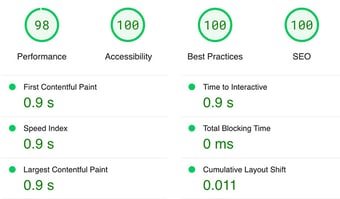
Report generated: Tues, March 7, 2023, based on Home Page - Opt 1.
6 min read
 Miriam-Rose LeDuc
:
March 23, 2023
Miriam-Rose LeDuc
:
March 23, 2023
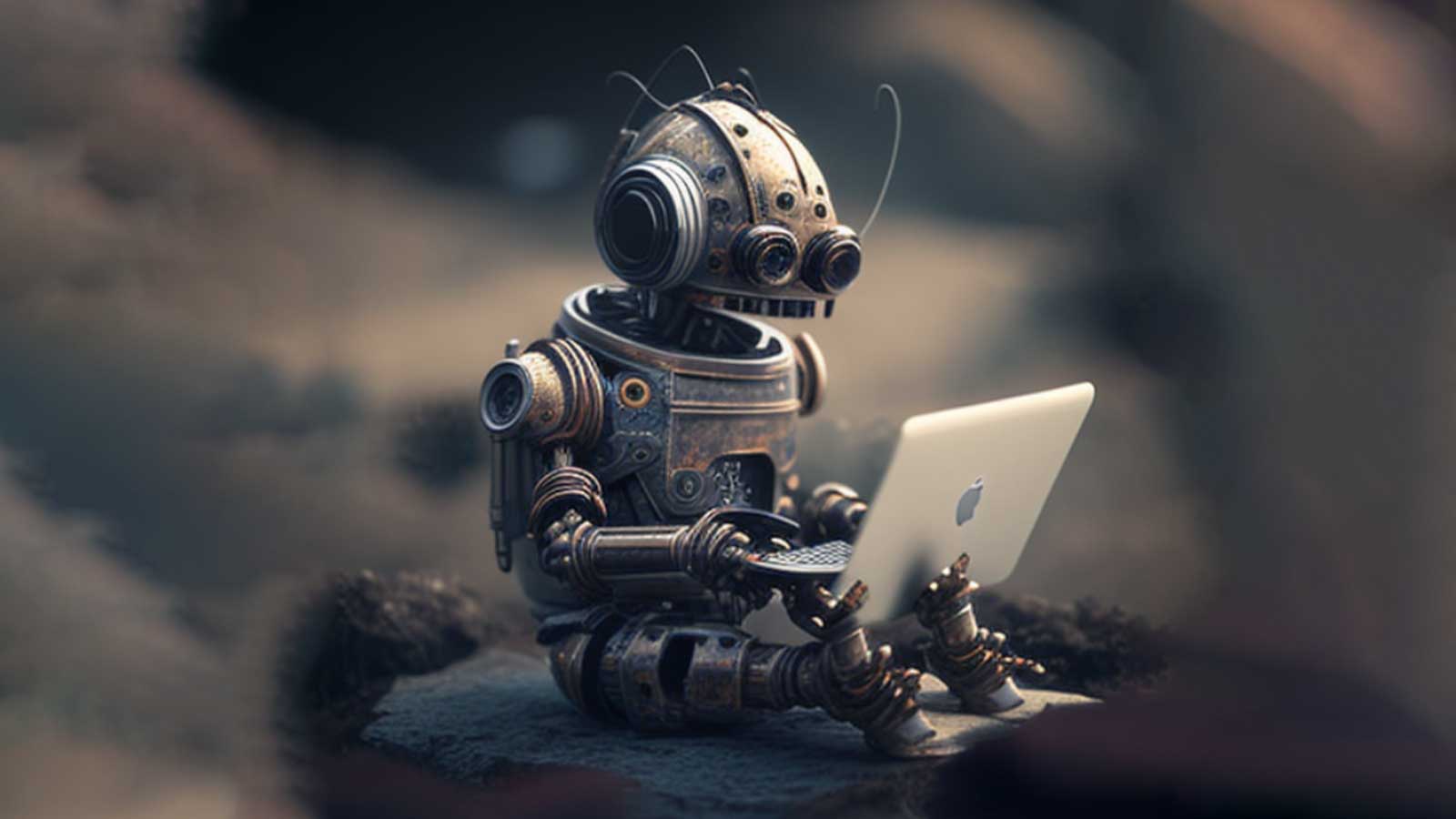
AI innovation is cruising at hyper-speed. In the last couple of weeks alone, we’ve seen the release of GPT4, the emergence of the Smart CRM with HubSpot’s ChatSpot and Salesforce’s Einstein GPT, and more. What could be next? And what does this mean for marketers?
We’re about to embark on a serious journey through the new AI space, and there may be some bumps along the way, so buckle up (but don’t worry, we’ll have some fun too).* Read on for copyright guidelines, debunked time-saving theories, use cases, and more.
We can’t predict the future AI landscape, but to understand the present, let’s blast into the past.
The concepts behind AI are nearly as old as humanity itself. From ancient myths to tales like Frankenstein and Pinnochio and progressing to feature films like Ex Machina, Her, AI, and 2001 Space Odyssey, the human desire to imagine and create intelligent life is evident throughout history.
In 1950, when Alan Turing published his paper on Computing Machinery and Intelligence, computers lacked the memory required to test whether or not they could think the way humans do (a question referred to as the “Turing test”). But, thanks to Moore’s law, technology continued to improve exponentially. Just a few years later, in 1955, the Logic Theorist was built to mimic the brilliant minds of mathematicians. The program created better mathematical proofs than humans and was a major breakthrough in computer science. By 1997, IBM’s Deep Blue supercomputer had beaten chess world champion Garry Kasparov in a suspenseful six-game match.
Today, the artificial intelligence industry has exploded into a gold rush. Big Tech is racing to gain control of the emerging terrain, and marketers are feeling the heat in light of massive layoffs. As new tools continue to hit the market, staying current feels like a matter of survival.
Game-changing market shifts like this have happened before. For example, the increased steam power and machines during the industrial revolution boosted the production of textiles, city populations, and the economy. Despite its positive effects on society, influential voices like Charles Dickens critiqued it for its repercussions on individual life.
Just as machines brought new possibilities to the industrial revolution (good and bad), AI will bring opportunity to our time. Innovation is imminent: and we decide how to respond to these new technologies.
So how will we, and how should we use these new tools? We’ll look at a couple of use cases together, but with so many options and the distracting new playground of platforms, it’s more important than ever to keep your why in the foreground.

One of the best AI benefits is the mass production of content at ludicrous speed. In theory, this would save content marketers a ton of time, but there’s a flip side (keep reading).
We’re discovering new use cases for AI daily, but here are a few that could come in handy for marketers today.
GPT4's strategic thinking is so good it's scary. I asked it to write a business plan for a budding idea, and it even suggested a business name, legal structure, target market, and exit strategy. Mind blown.

Give it a try: I dare you.
Tools like HubSpot’s Smart Content have already made personalization at scale into reality, but now there’s greater hope for an individualized customer experience (think custom CRM properties generated by ChatGPT). We could use these properties to store behavioral data, recommend products, write customized emails, and more.
AI can capture customer sentiment analysis across thousands of online mentions. You won’t need to spend hours filtering through survey responses yourself.
As a non-coder, I’m a big fan of Zapier for marketing automation. It's super robust, but I sometimes need a custom solution. In the past, I’ve scoured the internet for code snippets like a lost tourist in a foreign country. Thanks to ChatGPT, I now have a guide.
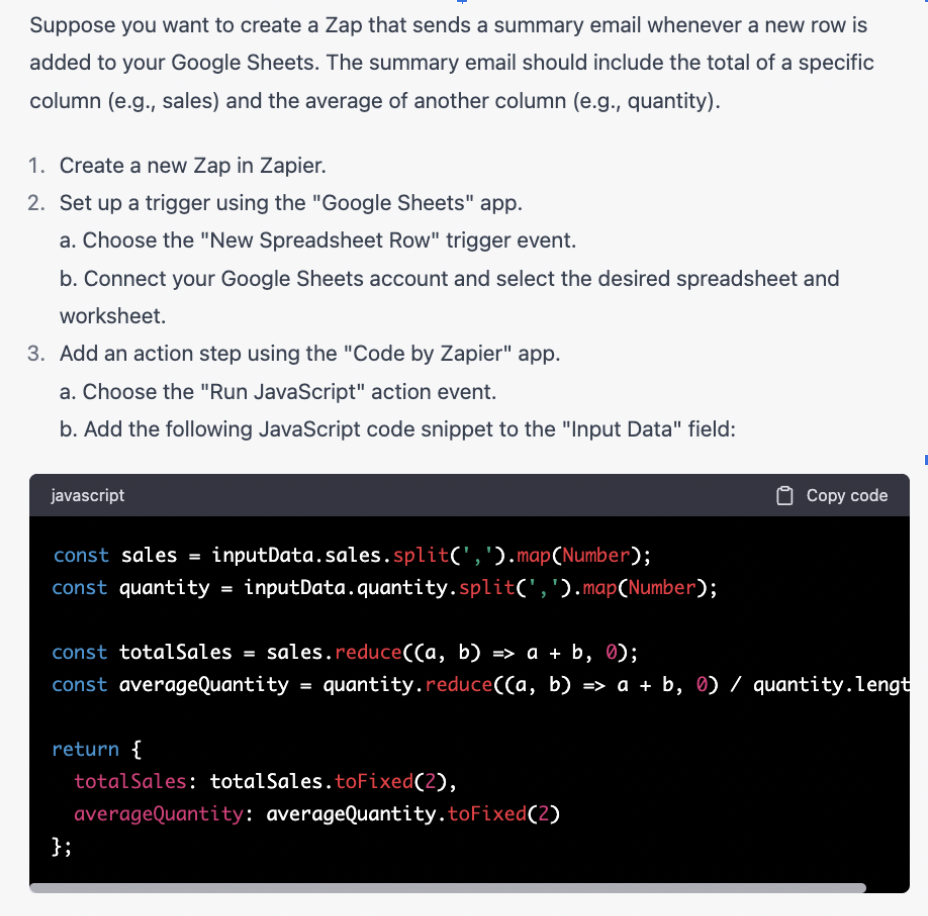
Generative AI is trending for turning human prompts into impressive visuals (like the featured image for this blog post, made with Midjourney and edited with Photoshop).
To source creative assets for your website, blog, or social posts, start with brand-defining exercises (like this one from our Brand Canvas): what six adjectives describe how you want your brand to be perceived?
At Helpful Hero, ours are:
Our brand colors include orange and blue, and while creative AI tools won’t recognize HEX codes, the Coolors color picker provides a brilliant workaround.
Just pop in the HEX code and use the color name to generate your AI image. For example, #8248B9 translates to Royal Purple.

Check out the difference between these two Midjourney images before and after I got specific with color and brand descriptions.
Before:
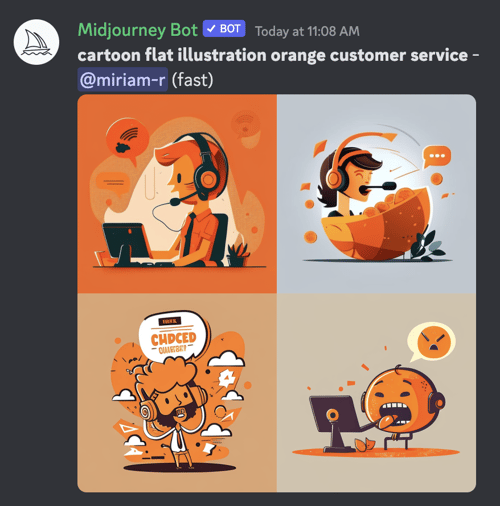
After:
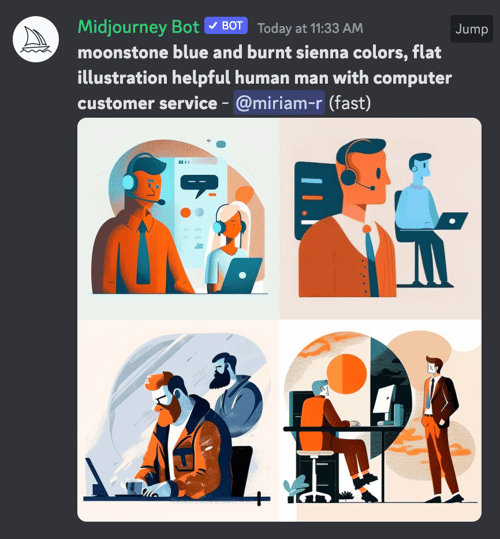
Different tools will have unique interpretations. Here’s what Dall-E produced with the same prompt:
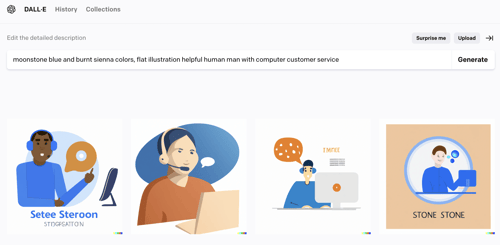
BOOM! You just saved yourself a whole bunch of time generating content for your site. Or did you?
The flip side of the time-saving argument comes from Parkinson’s Law. In 1955, C. Northcote Parkinson wrote an essay for The Economist in which he observed that work expands to fill the time available. The more time people dedicate in advance to a task, the longer it will take to complete it, even if they could have done it in less time.
It’s possible that as AI boosts productivity, industry expectations will increase. We’ll still have to put in the same number of hours each day but with double or triple the output. And then what? Have we really saved ourselves time or energy? Are productivity and efficiency essential to our work?
In his book Implementing Value Pricing, Ronald J. Baker suggests it’s not so simple. He writes:
“How would you go about increasing the productivity of a string quartet playing Beethoven? Would you drop the second violin or ask the musicians to play the piece twice as fast?"
He goes on to say:
"Efficiency in a professional firm, in and of itself, is not a competitive advantage. It is the equivalent of having restrooms. If your firm is not using the latest technological tools, that is incredibly inefficient; but if it is, so what? All of your competitors are too. The differences in firm revenue and profit cannot be explained by efficiency, only effectiveness in customer service, as well as the ability to create, communicate, and capture value. Efficiency is a table stake—the minimum you need to be in the game. Real competitive advantage is built on effectiveness, not efficiency.”
Baker may be on to something, but I wonder what tech giants like Meta (who just fired 10,000 humans to bet on AI efficiency) would say to him.
The US Copyright Office just published a Federal Release notice clarifying that any human prompting AI-generated content may not own the copyright to those works, depending on the extent to which the human was involved in its creative origin. Any image, blog post, logo, etc., you create exclusively with an AI generator can be stolen or repurposed by anyone, and there will be nothing you can do about it.
So before you create a year’s worth of AI-generated content, consider how the copyright implications might affect these creations. Maybe it won’t matter if a marketing email isn’t copyrightable, but what about your company logo? Do you want your brand assets to be that vulnerable? I don’t.
This doesn’t mean AI tools shouldn’t be part of your process. They can be a wonderful inspiration for works made by humans, and one way to ensure your brand assets are copyrightable is to employ live artists to create them.
There’s a growing concern about how AI will affect creative industries like photography, design, copywriting, music, etc. Publications like Wired magazine are taking a stance on how they will (or won’t) use these tools, partly because of pending lawsuits from artists whose works were used to train the models.
I don’t believe these image generators are a replacement for human creativity. Why? Aside from copyright issues, AI relies on human prompts and is only as good as our imaginations. In fact, artists may have an advantage in using them. Photographers, for example, have a trained eye for the type of lens or lighting that could best capture their vision.
As long as tools like ChatGPT have a knowledge cutoff, they may feed you incorrect or outdated information:

Get with the times, ChatGPT.

AI-based search engines like Google's Bard are in the works but not yet public. Save yourself the trouble of relying on these tools for accurate information.
Not only is AI unreliable, but it can be downright inflammatory.
Big Tech may be so eager in its race to push products to market that they repeat the same mistakes it made with social media. Algorithms on platforms like Facebook and Twitter have led to increased polarization over the last decade. Since generative AI emulates human thinking, many earlier AI models were similarly susceptible to bias. According to a recent article for Time Magazine, OpenAI's 2020 predecessor to ChatGPT exhibited “levels of racism and misogyny.” And Microsoft’s recent AI-powered Bing chatbot didn’t perform much better after spewing hatred toward tech reporter Matt O'Brien and declaring love to New York Times reporter Kevin Roose.
While newer models are in testing to prevent harmful solutions, there’s a lot we still don’t know. These times are exciting and scary, and unforeseen use cases pose the greatest threat and potential danger of generative AI. And if we can’t predict it, we can’t protect against it.
How will you choose to wield this great force? Will your company take a stance on AI use? Will you explore use cases to boost creativity? Will you embrace a shortened workday with the time you’ve saved, or insist on increased output?
Just don’t go to the dark side. :)
*BONUS: This non-copyrightable, AI-generated image of a Jedi pug with a lightsaber is perhaps the best thing on the internet. Please feel free to share with friends.

P.S. A real human wrote this article. ;)

The last few years at HubSpot’s annual INBOUND conference have been “all about AI.” This year? Inbound 2025 was less hype and more real-life...

Oh, content: the crown jewel of inbound marketing. The idea is simple. Write a bunch of stuff, slap it up on your website, and watch sales start...
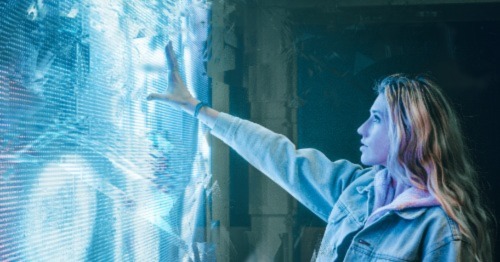
Want to stay ahead of the game in the evolving marketing landscape? You’re in the right place. Named by Forbes as a "must-attend event...